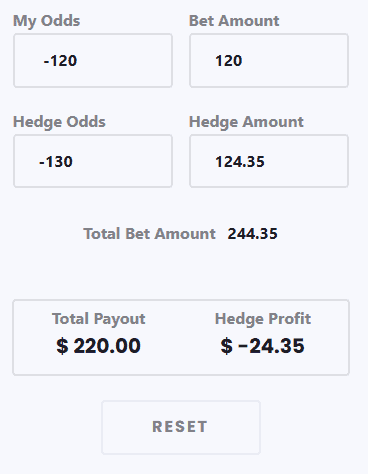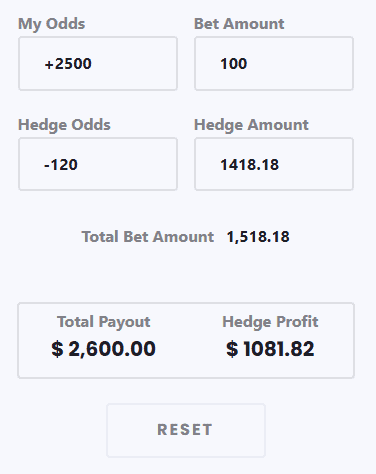What does hedge mean in betting? Hedge betting in sports places an additional bet or bets opposite to your initial bet. It is done so that you will receive a return no matter the event's outcome. This article will explain what hedging means in sports betting, its advantages and strategies, and tips on hedging bets.
What Is Hedge Betting & How Does it Work?
The first thing for hedge betting is making an initial bet, such as the winner of an NFL game. Before the game or while it is happening, new information may steer you from your initial pick. The new info can be odds changing, injuries, or how the team plays in the game. These things can have an impact on the odds of the game.
Because you are unsure about your initial bet, you can hedge the bet by making an additional one and betting on the other team with odds that are not the same as the first wager.

It does not matter what the game's outcome is, as since you made a bet on both sides, you will guarantee a return. When you hedge a bet, you will not have a guaranteed profit, but with more than one bet, you may make one or at least lessen the loss of your initial wager.
Hedge betting is more of a betting strategy than a specific type of sports bet, such as the spread or moneyline. You can hedge bets on various types, such as parlays, futures, live bets, and straight bets.
Key Advantages of Hedge Betting
The main advantage of hedging bets is that they act as insurance against losses. If you are betting on both sides of a game or event, it ensures you will get some return.
What is the Payout for an Over/Under Bet?
For any hedge bet, since you are ensuring a return, it means that you are limiting losses. Rather than lose the entire amount of the initial wager, one of your two bets will come in when you hedge a bet. You may not make a profit, but you may, but you will not lose big.
Strategies/how to place a successful hedge bet
Regarding hedge betting strategies, there are two basic schools of thought: partial hedge and full hedge.
Understanding Hedge Types: Partial vs. Full
- Partial hedge: Making a smaller wager on the opposite outcome of your first bet.
- Full hedge: Betting the same or more on the opposite outcome of your initial bet.
A lot goes into making a successful hedge bet. If you are confident in your first bet, you would likely not hedge, believing that the first wager you made will be successful. However, hedging can be a good option if your confidence wanes on the first bet you make.
One of the main things to look at when you want to make a successful hedge bet is evaluating the potential outcomes of the hedge as well as the associated odds. One of the best times to jump on a hedge bet is if the odds move significantly for the opposite outcome of your initial bet. When this happens, it gives you a good opportunity to profit by betting against your first bet.
Examples of Hedge Betting: Minimizing Losses and Turning a Profit
There are times to hedge bets when you minimize losses and when you can profit. Let's look at a couple of examples of both.
Example 1: Minimizing Losses
We mentioned a game before with the Cowboys as the favorites to beat the Commanders at -120. You bet $120 on the Cowboys at -120, so your profit on them winning is $100. It is still early in the game, but Dallas is not looking good, or a key player was injured. You do not feel good about your initial bet, so you hedge by betting $124.35 on the Commanders at -130.
If the Commanders win, your profit from that bet is $95.65. Subtracting your initial $120 stake on the Cowboys, your overall loss is $24.35.
If the Cowboys win, your profit from that bet is $100. Subtracting the $124.35 hedge bet, your overall loss is also $24.35.

By hedging, you’ve minimized your potential loss to $24.35 instead of risking losing your entire $120 stake
In the above example, you hedge a bet and lose money, but not as much as if you stick with your original bet.
Example 2: Turning a Profit
You bet $100 on the Eagles to win the Super Bowl at +2500. They make it to the Super Bowl against the Kansas City Chiefs, the favorite at -120. You hedge your first bet and wager $1418.18 on the Chiefs to win.
If the Eagles win, your total payout would be $2600. Subtracting the $1418.18 hedge bet, your profit would be $1181.82.
If the Chiefs win, your hedge payout would be $2600 (including the initial stake). Subtracting the $100 bet on the Eagles, your profit would also be $1081.82.

As in the example above, you can calculate potential profits and losses from hedging using online hedge betting calculators.
Tips for Effective Hedge Betting
The main tip for making a hedge bet is to evaluate the wager's loss or profit. When you see line movements that can make you a profit, albeit smaller than riding out your first bet, taking the hedge bet may be a good idea. With a bet of this type, you can guarantee a smaller profit and reduce the risk of losing a significant amount of money.
Types of Bets You Can Hedge
- Futures bets (like the Super Bowl example)
- Parlay bets
- Live betting opportunities
You need to pinpoint what type of bet you want to hedge. In the example above in the Super Bowl matchup between the Lions and the Chiefs is an example of a futures wager hedge bet.
Parlay Betting Example:
In a parlay bet, let's say you won the first three legs for NFL games, and your last game is on Monday night. You could bet on the opposite of your last leg of the bet and either win that bet or the whole parlay. Either way, you are walking away a winner, and if you win the entire parlay, you will likely turn a profit.
Live betting is becoming increasingly popular with hedge bets, as you are betting on the live action. If you bet on the Chiefs to beat the Broncos and Patrick Mahomes suffers an injury where he will not play the rest of the game, you can take the Broncos against your initial bet to ensure a win.
Essential Tips:
- ✔️ Monitor lines frequently to spot favorable odds
- ✔️ Track public betting patterns
- ✔️ Be aware of your risk tolerance
- ✔️ Use a hedge betting calculator to know the exact profit/loss potential
Monitoring lines is also a valuable tip when hedging bets. Check the lines often, as if they change, you can get a feel of how the public is betting, such as on a football game, and get more favorable odds when hedging a bet.
Always be aware of risk tolerance. When calculating a hedge bet's profit or loss, you need to know the exact risk or reward factor. This is why hedge calculator betting is a good idea: You always know the profit and loss. Again, many top sites offer a hedge betting calculator.
Managing Your Bankroll with Hedge Betting
For a hedge bet to any bet, you must gamble responsibly. Sports betting is supposed to be fun and a form of entertainment. Sure, winning money is always a bonus, but it is a form of gambling, and you need to know there is a chance you will lose. You may want to take a break if you are not having fun anymore and sports betting is becoming stressful. This is especially the case if you hit a losing streak, which costs you significant money.
Smart Money Management Guidelines:
- ✔️ Have a set bankroll and stick to it
- ✔️ Set a specific gambling amount for each season
- ❌ Never gamble with money you cannot afford to lose
- ❌ Never chase losses
Chasing losses is betting more on the next game or event to regain money lost. Doing this is the quickest way to lose money. The best way to get over a loss or losses is to chip away and not try to get it all back in one fell swoop.It is also important that you bet with your head rather than your heart. Avoid making emotional decisions when betting on sports. Take some time and research the sports bet you want to make, and do not just bet because you like a team or player. The more you research (handicap) a bet, the more likely it will be a smarter bet and, therefore, one that is more likely to win.
⚠️ Legal Betting Requirements:
You must bet on sports at sportsbooks that are legal in your state. Playing at a legal and licensed sportsbook means betting at a safe site with security measures to protect your personal and financial information. The legal sportsbooks are licensed by a recognized state gaming body and regulated by them.
Using an offshore sportsbook is always a bad idea. The site may carry a license, but since it is not under U.S. jurisdiction, American citizens are not fully protected if issues arise.
Conclusion: Is Hedge Betting Right for You?
Hedge betting is making an additional wager with the opposite outcome of your initial bet. By doing this, you can ensure one of your bets can win. Hedging bets can minimize losses and help you profit if the odds are in your favor. You can hedge bets for football and many other sports.
We have covered aspects of hedging, but we recommend you do further research to learn more about it and how you can succeed.

